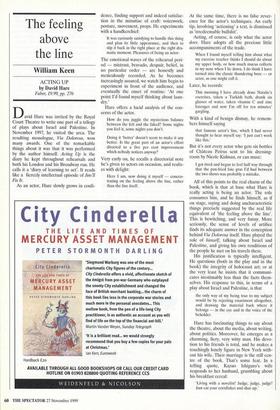The feeling above
the line William Keen
ACTING UP by David Hare Faber, £9.99, pp. 276
David Hare was invited by the Royal Court Theatre to write one part of a trilogy of plays about Israel and Palestine. In November 1997, he visited the area. The resulting monologue, Via Dolorosa, won many awards. One of the remarkable things about it was that it was performed by the author himself. Acting Up is the diary he kept throughout rehearsals and both his London and his Broadway run. He calls it a 'diary of learning to act'. It reads like a fiercely intellectual episode of finell Fix It.
As an actor, Hare slowly grows in confi-
dence, finding support and indeed satisfac- tion in the minutiae of craft: voicework, posture, movement, props. He experiments with a handkerchief:
It was curiously satisfying to handle this thing and plan its little appearance, and then to Slip it back in the right place at the right dra- matic moment. Pleasures of being an actor.
The emotional waves of the rehearsal peri- od mistrust, bravado, despair, belief, in no particular order — are honestly and meticulously recorded. As he becomes increasingly assured, we watch him begin to experiment in front of the audience, and eventually the onset of routine: 'At one point I'd found myself thinking about laun- dry.'
Hare offers a lucid analysis of the con- cerns of the actor.
How do you juggle the mysterious balance between the felt and the faked? Some nights you feel it, some nights you don't.
Doing it 'better' doesn't seem to make it any better. Is the great part of an actor's effort directed to a five per cent improvement which nobody notices anyway?
Very early on, he recalls a directorial note he's given to actors on occasion, and realis- es with delight:
Here I am, now doing it myself — concen- trating on the feeling above the line, rather than the line itself.
At the same time, there is no false rever- ence for the actor's techniques. An early tip, involving `actioning' a text, is dismissed as 'irredeemable bullshit'.
Acting, of course, is only what the actor does. Hare adopts all the precious little accompaniments of the trade.
When I found myself telling him about what my exercise teacher thinks I should do about my upper body, or how much mucus collects in my nose when I lie down, I do think I have turned into the classic thundering bore — or actor, as one might call it.
Later, he records:
This morning I have already done Natalie's exercises, taken a Turkish bath, drunk six glasses of water, taken vitamin C and zinc lozenges and now I'm off for ten minutes' gargling.
With a kind of benign dismay, he remem- bers himself saying
that famous actor's line, which I had never thought to hear myself say: 'I just can't work like this.'
But it's not every actor who gets six bottles of Château Petrus sent to his dressing. room by Nicole Kidman, or can muse:
I got tired and began to feel half way through that the pan-fried foie gras I'd had between the two shows was probably a mistake.
All of this points to the real charm of the book, which is that at base what Hare is really acting is being an actor. The role consumes him, and he finds himself, as if on stage, saying and doing uncharacteristic things precisely suggested by the real life equivalent of 'the feeling above the line'. This is bewitching, and very funny. More seriously, the sense of levels of artifice finds its adequate answer in the conception behind Via Dolorosa itself. Hare played the role of himself, talking about Israel and Palestine, and giving his own renditions of the people he met on his travels there.
His justification is typically intelligent. He questions (both in the play and in the book) the integrity of holocaust art; or at the very least he insists that it communi- cates inestimably less than the facts them- selves. His response to this, in terms of a play about Israel and Palestine, is that
the only way of my being true to my subject would be by rejecting enactment altogether, and drawing the material back where it belongs — in the eye and in the voice of the beholder.
Hare has fascinating things to say about the theatre, about the media, about writing, about politics. Moreover, he emerges as a charming, fiery, very witty man. His devo- tion to his friends is total, and he makes a touchingly lonely figure in New York with- out his wife. Their marriage is the still cen- tre of the book. That's some feat. In a telling quote, Kazuo Ishiguro's wife responds to her husband, grumbling about his breakfast cereal: 'Living with a novelist! Judge, judge, judge! Just eat your cornflakes and shut up.'


























































































 Previous page
Previous page